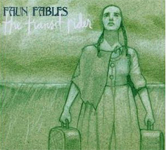|
|
 |
Dusted Reviews
Artist: Faun Fables Album: The Transit Rider Label: Drag City Review date: Jun. 1, 2006 |

|
|
|
 |
Faun Fables’ The Transit Rider is based on a 2002 theatrical production by the group (mainly duo Dawn McCarthy and Nils Frykdahl, aided by producer/bassist Dan Rathbun and other occasional guests). Since then, McCarthy and Frykdahl have added material to the show, which was remounted earlier this spring. As the title suggests, The Transit Rider deals with the theme of travel, with a particular focus on themes of escape and discovery. It’s something of a disappointment that the album doesn’t come with an accompanying DVD – one sometimes gets the impression that part of the whole is missing – but The Transit Rider manages to impress even without the visuals.
Like Faun Fables’ previous album, 2004’s excellent Family Album, The Transit Rider draws upon a wide variety of sources. In addition to McCarthy and Frykdahl’s originals, the album includes covers of an English ballad (“The House Carpenter”), Soeur Sourire’s (a.k.a. “The Singing Nun”) “I’d Like to Be,” and Polish theater and film music composer Zygmunt Konieczny’s “Taki Pejzaz.” The mix is eclectic to be sure, but the end result is slightly more coherent than Family Album, both musically and lyrically.
While their use of predominately acoustic instruments, affinity for folk songs, and Northern Californian base of operations might tempt one to lump them in with Devendra Banhart, Joanna Newsom, et al, Faun Fables have little in common with their would-be peers: Their approach avoids the iconoclastic, persona-driven aesthetic of a Banhart, Newsom, or Will Oldham (with whom McCarthy is currently working) in favor of more flexible and markedly theatrical one. The theatrical approach is in full effect on The Transit Rider, as McCarthy channels a medieval British housewife and her demonic seducer (on “The House Carpenter”) the voices from a crowd of subway passengers (“The Questioning”) and a soulless caffeine-fueled modern professional (“In Speed”).
While their lyrical role-playing is comprehensible enough, it’s a bit more difficult to ascertain what McCarthy and Frykdahl are up to musically: the bulk of The Transit Rider can’t really be described as folk, despite its acoustic palette. It might be more useful to invoke the pseudo-medieval aesthetic of Nico’s The Marble Index as a comparison, although Faun Fables’ polished arrangements and performances are a far cry from Nico’s untrained dirges. Nonetheless, both artists share an ability to create music that invokes the past, yet cannot be easily placed owing to its own self-enclosed qualities. Not as easily pinned down or absorbed as many of their peers, Faun Fables are one of the few groups capable of creating music that feels deeply rooted in a pre-modern tradition (albeit a somewhat obscure and difficult-to-define one), yet sounds like nothing you’ve heard before.
By Michael Cramer
|







